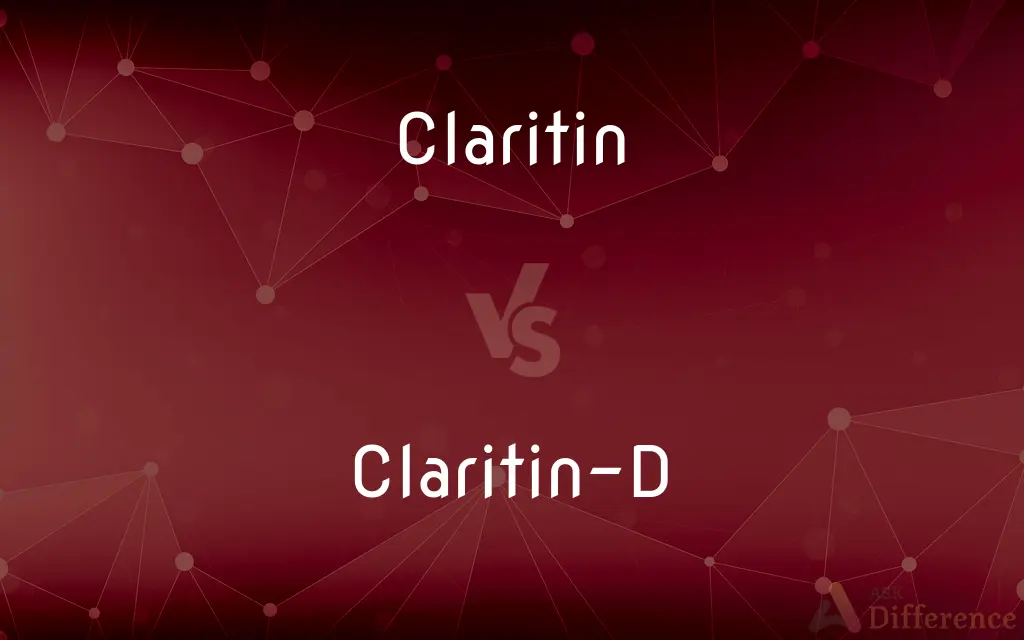Claritin vs. Claritin-D — What's the Difference?
By Tayyaba Rehman — Published on January 20, 2024
Claritin is an antihistamine used for allergy relief, while Claritin-D combines antihistamine with a decongestant for additional relief from nasal congestion.

Difference Between Claritin and Claritin-D
Table of Contents
ADVERTISEMENT
Key Differences
Claritin, generically known as loratadine, is an over-the-counter medication primarily used to treat allergy symptoms like sneezing, itching, and watery eyes. Claritin-D, on the other hand, includes the same antihistamine properties of Claritin but adds a decongestant called pseudoephedrine.
The primary function of Claritin is to block histamines, which are chemicals in the body that cause allergy symptoms. Claritin-D not only blocks histamines but also helps reduce nasal congestion and sinus pressure due to its decongestant component.
Claritin is known for its non-drowsy formula, making it suitable for daytime use without causing sleepiness. Claritin-D, while also generally non-drowsy, may cause sleeplessness or nervousness in some people due to the pseudoephedrine.
Claritin is typically taken once daily for relief from allergies. Claritin-D may require a government-issued ID for purchase in some regions due to the pseudoephedrine content, which can be misused to manufacture illegal drugs.
Regarding side effects, Claritin is less likely to cause drowsiness compared to other antihistamines. Claritin-D can have additional side effects like increased heart rate or blood pressure due to the decongestant.
ADVERTISEMENT
Comparison Chart
Active Ingredient
Loratadine (antihistamine)
Loratadine and Pseudoephedrine (decongestant)
Primary Use
Relieves allergy symptoms
Relieves allergy symptoms and nasal congestion
Drowsiness
Generally non-drowsy
May cause sleeplessness or nervousness
Purchase Requirements
Available over-the-counter without restrictions
May require ID for purchase due to pseudoephedrine
Potential Side Effects
Fewer; mainly non-drowsy
Increased heart rate, blood pressure concerns
Compare with Definitions
Claritin
Claritin is an antihistamine medication used to treat symptoms of allergies.
She takes Claritin daily during spring to manage her pollen allergies.
Claritin-D
While effective, Claritin-D can cause some nervousness or sleeplessness.
She prefers to take Claritin-D in the morning to avoid any sleep disturbances.
Claritin
It works by blocking the action of histamines that cause allergic reactions.
Taking Claritin reduces his allergic reactions to pet dander.
Claritin-D
Claritin-D combines an antihistamine with a decongestant for comprehensive allergy relief.
Claritin-D is effective for his allergies, especially when he has nasal congestion.
Claritin
Claritin offers relief without causing drowsiness, suitable for daytime use.
Claritin is her preferred allergy medicine because it doesn't make her sleepy.
Claritin-D
It includes pseudoephedrine, which relieves nasal and sinus congestion.
She uses Claritin-D to clear her stuffy nose during cold and allergy seasons.
Claritin
Claritin is available over-the-counter and is safe for most adults and children.
Claritin is her go-to medication for treating her children's seasonal allergies.
Claritin-D
Claritin-D may require identification to purchase due to its pseudoephedrine content.
He had to show his ID at the pharmacy to buy Claritin-D.
Claritin
It is known for its effectiveness in relieving sneezing, itching, and watery eyes.
Claritin helped alleviate his itchy eyes during allergy season.
Claritin-D
It is beneficial for those who experience both allergies and sinus pressure.
Claritin-D relieves her sinus pressure along with allergy symptoms.
Common Curiosities
Does Claritin-D require a prescription?
Claritin-D does not require a prescription, but due to the pseudoephedrine content, it may require ID for purchase.
Is Claritin safe for daily use?
Yes, Claritin is generally safe for daily use as directed.
What are the main uses of Claritin?
Claritin is used to treat common allergy symptoms like sneezing, itchy eyes, and runny nose.
Can Claritin be used for skin allergies?
Yes, Claritin can be effective in treating skin allergies like hives.
Can I take Claritin if I'm pregnant or breastfeeding?
It's important to consult a doctor before taking Claritin or Claritin-D during pregnancy or breastfeeding.
Can I drink alcohol while taking Claritin or Claritin-D?
It's best to avoid alcohol while taking these medications, as it can increase drowsiness or dizziness.
Is there a difference in dosage between Claritin and Claritin-D?
The dosage may vary, especially because of the added pseudoephedrine in Claritin-D. Always follow the package instructions.
How is Claritin-D different from regular Claritin?
Claritin-D includes a decongestant (pseudoephedrine) in addition to the antihistamine found in regular Claritin.
Can Claritin-D cause sleeplessness?
Yes, the decongestant in Claritin-D can cause sleeplessness or nervousness in some people.
Does Claritin interact with other medications?
Claritin has few interactions, but it's important to consult a healthcare provider about potential interactions with other medications.
Is Claritin-D more effective than Claritin for nasal congestion?
Yes, Claritin-D is specifically designed to also address nasal congestion, making it more effective for that symptom.
Are there age restrictions for taking Claritin or Claritin-D?
Claritin and Claritin-D are generally safe for adults and children, but it's recommended to check specific age guidelines on the package.
How quickly does Claritin-D work?
Claritin-D generally begins to work within an hour of ingestion.
Are there any long-term side effects of using Claritin or Claritin-D?
There are no known long-term side effects when used as directed, but it's important to consult a healthcare provider for individual concerns.
Can Claritin or Claritin-D cause dry mouth?
Dry mouth is a possible side effect, especially with Claritin-D due to the decongestant.
Share Your Discovery

Previous Comparison
Standard Time vs. Normal Time
Next Comparison
CIMA vs. ACMAAuthor Spotlight
Written by
Tayyaba RehmanTayyaba Rehman is a distinguished writer, currently serving as a primary contributor to askdifference.com. As a researcher in semantics and etymology, Tayyaba's passion for the complexity of languages and their distinctions has found a perfect home on the platform. Tayyaba delves into the intricacies of language, distinguishing between commonly confused words and phrases, thereby providing clarity for readers worldwide.












































